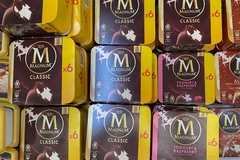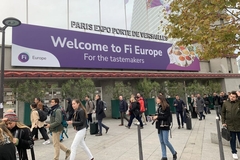
- Industry news
Industry news
- Category news
Category news
- Reports
- Key trends
- Multimedia
- Journal
- Events
- Suppliers
- Home
- Industry news
Industry news
- Category news
Category news
- Reports
- Key trends
- Multimedia
- Events
- Suppliers
Pepsi Profits Down in Q2 on Currency, Gatorade Franchise Declines

Although G2 continues to post double-digit volume growth, the overall Gatorade franchise continues to experience declines as casual users turn to less expensive LRBs in this challenging economy.

23 Jul 2009 PepsiCo, Inc. has reported solid revenue and operating profit results in the second quarter of 2009, reflecting strong effective net pricing, product innovation and cost discipline. Reported EPS of $1.06 was flat on a 3 percent decline in net revenue. In constant currency, the company delivered a 5.5 percent increase in net revenue and an 8 percent increase in core EPS.
On a constant currency basis, PepsiCo Americas Foods (PAF) delivered 9 percent net revenue and 10 percent core operating profit growth led by Frito-Lay North America and Latin America Foods. Solid performance was driven by effective net revenue management and cost control.
Frito-Lay North America (FLNA) constant currency net revenue grew 8 percent, constant currency core operating profit grew 8 percent and volume was up 3 percent. Volume growth was driven by strong performance in FLNA's core brands such as Lay's and Doritos, supported in part by the "20% more" promotion on its take-home sized, corn-based offerings. Dips and Multipacks, together with healthy adjacencies to the core portfolio such as TrueNorth nuts, Sabra dips, Spitz seeds and Stacy's pita chips, also contributed to the growth in volume.
Product innovation highlights in the quarter included line extensions of core brands such as Doritos Late Night and Giant Cheetos. In addition to driving innovation in its product line, FLNA deployed shelf innovation at over 8,000 stores. The streamlined displays create a more inviting and intuitive shopping experience and prominently feature FLNA's health and wellness offerings.
Quaker Foods North America (QFNA) posted a 1 percent decline in constant currency net revenue while constant currency core operating profit grew 9 percent as it overlapped costs related to the Cedar Rapids flood last year. Quaker continues to be recognized as a leading health and wellness brand, with whole grain credentials. However, during the quarter, some value conscious consumers traded down to lower priced offerings resulting in volume declines in some of the product lines such as oatmeal. We continue to focus on the global expansion of the Quaker franchise while innovating for the value consumer in the meantime.
Latin America Foods (LAF) constant currency net revenue grew 12 percent, constant currency core operating profit grew 18 percent and volume was flat. LAF's performance was driven by pricing actions, disciplined cost control and productivity improvements, all of which more than offset input cost inflation. In Mexico, we saw the usual portfolio effect amidst difficult economic times: while volume was down at Sabritas, in part because of pricing to offset input costs, it was up at Gamesa, which benefited from innovation in its new "better-for-you" line of Quaker snacks. Importantly, both businesses drove increases in constant currency net revenue and constant currency core operating profit, and deftly managed through the adverse impact on demand of the H1N1 virus outbreak. Volume in South America was up, driven by double-digit volume gains in Brazil and strong results in the Southern Cone.
PepsiCo Americas Beverages (PAB) constant currency net revenue declined 7 percent, constant currency core operating profit was down 5 percent and volume declined 6 percent. The overall results reflect the challenging underlying liquid refreshment beverage (LRB) category dynamics, consumer shifts to lower-priced options, an intensely competitive environment as well as deliberate strategic choices on our part. Improvement in the underlying sequential trends in our business and improving brand equity scores give the company cause to believe that the investments we are making are having a favorable impact on our portfolio.
In CSDs, which account for 45 percent of the LRB category, the company introduced a number of innovations: brand Pepsi's "Refresh Everything" campaign; Mtn Dew Game Fuel and Voltage; Sierra Mist Ruby Red; and limited edition "Throwback" variations of Pepsi and Mtn Dew, featuring retro graphics and sweetened with all-natural sugar. Brand Mtn Dew posted another quarter of positive growth and PepsiCo's Diet CSD portfolio gained share.
Pepsi’s naturally-sweetened, zero-calorie products featuring stevia-based PureVia(TM) are successful. SoBe LifeWater, the fastest growing enhanced water brand, recorded very impressive growth rates, and Trop50 is also performing well.
Although G2 continues to post double-digit volume growth, the overall Gatorade franchise continues to experience declines as casual users turn to less expensive LRBs in this challenging economy. Pepsi said that their conscious strategy is to maintain the integrity of the brand by sharpening our focus on core fitness users, for whom the functionality of the product remains paramount. Brand regard scores within the core fitness cohort group are high and improving and the new campaign focused on active thirst has also been well received. The goal is to migrate the casual drinker and wellness oriented Gatorade consumers to new offerings in 2010, which will soon be announced. “The strength of our overall portfolio allows us to make the necessary investments to rejuvenate our North American beverage business in a judicious manner,” the company reported.
PepsiCo International (PI) drove solid performance in the second quarter, despite macroeconomic headwinds, resulting in double-digit, constant currency net revenue and constant currency core operating profit growth.
In the quarter, the recession deepened in Europe as real GDP declined across the region. In this challenging environment, our teams demonstrated their operating agility by optimizing revenue while maintaining tight cost controls and leveraging productivity gains to protect profitability. On a constant currency basis, Europe net revenue grew 10 percent and core operating profit grew 15 percent. On a constant currency basis, acquisitions contributed 10 percentage points to net revenue growth and 6 percentage points to core operating profit growth.
In Europe snacks, volume declined 1 percent, which included 4 percentage points of growth from the Marbo acquisition. Volumes were adversely impacted by pricing actions, including weight outs, to offset local commodity inflation. Nevertheless, the business maintained market share. In the U.K., Walkers grew revenue share through disciplined pricing and the continuing success of its "Do Us a Flavour" campaign.
In the Europe beverage business, volume grew 2 percent driven by the favorable impact of the Lebedyansky acquisition. While volumes declined in Eastern Europe, CSDs posted impressive growth in the United Kingdom aided by relevant promotions and price pack architectures, such as the "Big Night In" pack, targeted to consumers who are opting to eat at home more often due to macroeconomic pressure.
On a constant currency basis, Asia/Middle East/Africa (AMEA) net revenue grew 14 percent and core operating profit improved 21 percent. On a constant currency basis, the net impact of acquisitions contributed 1 percentage point to both net revenue and core operating profit growth. This balanced performance resulted from effective net revenue management and cost discipline across the businesses.
AMEA division beverage volume grew 8 percent. Volume growth was broad-based across geographies and categories with particular strength in India and the Middle East. India's strong momentum across both CSDs and NCBs was driven largely by investments to expand cooler space across the country and from relevant local product innovations such as Nimbooz, the company's version of traditional lemonade served in most Indian households. In China, PepsiCo continues to expand its beverage portfolio, launching Pepsi Max, Mtn Dew and expanding distribution of its Tropicana juice drinks.
AMEA division snacks volume grew 3 percent. This growth was broad-based, including developed markets such as Australia and developing markets in the Middle East.
AMEA continues to invest in under penetrated areas and broaden the health and wellness offerings in its portfolio. In the third quarter, the company entered into a strategic alliance with Calbee Foods Company to produce and sell a wide range of food products in Japan. The company also recently announced that its joint venture with Almarai has acquired 75 percent of Teeba, one of the leading fresh dairy producers in Jordan that produces and distributes fresh juice products.
PepsiCo's food and international businesses are performing well around the world and the company is confident in the strength of its diversified portfolio and the agility of its operating model to continue to deliver solid results. As a result, the company reaffirms its full-year 2009 guidance for both net revenue and core EPS of mid- to high-single-digit constant currency growth over its 2008 core EPS of $3.68. The company estimates that foreign exchange, at current rates, would have roughly a 6 percent adverse impact to its full-year constant currency core EPS. Where in the guidance range the company may fall could be impacted, among other things, by changes in foreign exchange rates and the pacing of share repurchases. The company did not repurchase its shares in the first two quarters and does not anticipate repurchasing its shares until there is a resolution of the proposed transactions with The Pepsi Bottling Group, Inc. and PepsiAmericas, Inc.










